A Snapshot
Income losses of up to 100 % and still-non-existent perspectives on how, in what form, and above all when things might be able to go forward: that’s the situation in mid-April for numerous arts and cultural professionals in Austria. The initial working grant programmes, assistance funds, and other support measures have been set up—but for many individuals, these offerings don’t come close to eliminating the (often enough existential) threat posed by the current situation. As things stand, we’re still facing lots of open questions and unknown consequences in all dimensions of society that will probably be remaining with us for quite some time. So now more than ever, the enormous societal significance of the arts and culture needs to be emphasised, and one can hope that we will be able to preserve their unbelievable diversity even after the coronavirus and the necessary mitigation measures have finished doing their worst.
In early April, mdw Magazine asked (former) students to provide us with brief impressions of the Covid-19 mitigation measures’ immediate effects on artists as well as on their personal (working) situations—some of which, by the time this issue is published, may look yet again entirely different. In their responses, these artists also shared with us how they’re dealing personally with the overall situation and with just what emotions they’re currently peering into the post-coronavirus future.
A study by Dagmar Abfalter, Sandra Stini, and Paul Nagl then gives us a look at the income losses being experienced by freelance musicians due to Covid-19.
Peter Tschmuck provides us with some numbers: How are the financial effects shaping up across the music industry, and what kinds of losses should we be expecting for the international music business as a whole?
Leonhard Paul—head of the Joseph Haydn Department and a co-founder of Mnozil Brass—portrays his current everyday life with online teaching and without concerts, and he warns us against getting all too used to this truly exceptional situation. And finally, Wilfried Aigner tells interviewer Isabella Pohl why music instruction is of enormous significance particularly now.
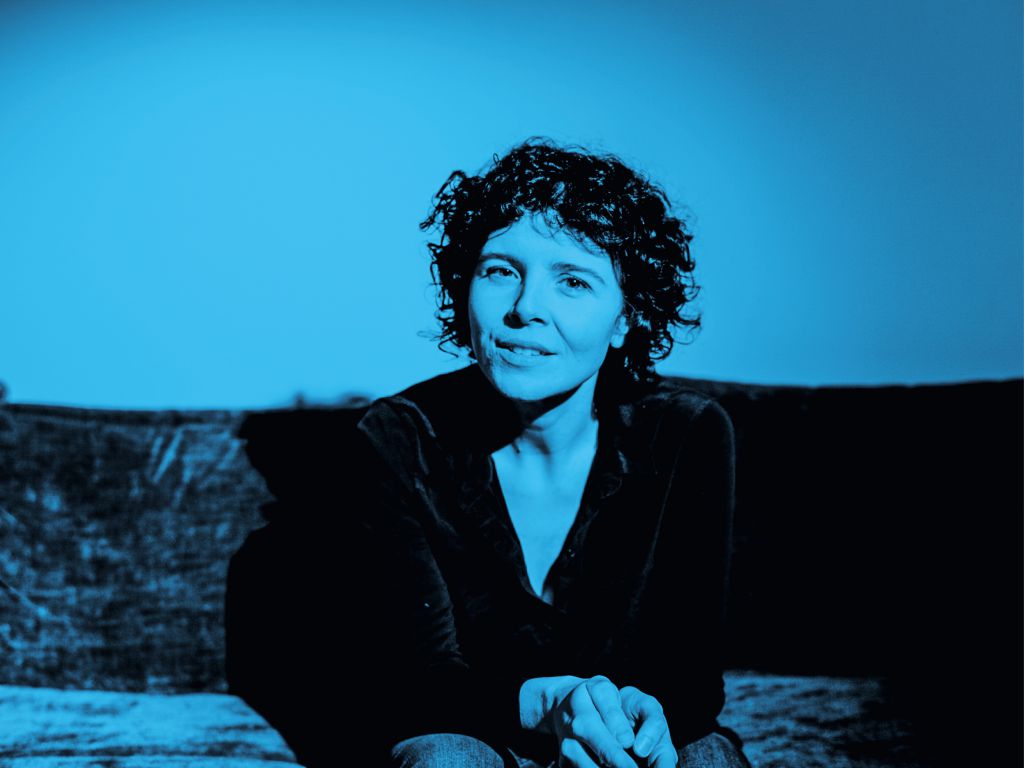
Marie Kreutzer
Screenplay writer, director, & dramaturge
Marie Kreutzer writes screenplays and also works as a film director (Die Vaterlosen, Gruber geht, Was hat uns bloß so ruiniert, Der Boden unter den Füßen) and dramaturge. Due to the measures introduced to combat the spread of the coronavirus, filming work for her ORF/ZDF rural detective series Vier, which was slated to begin on 11 March, had to be interrupted. Her next cinematic production, Corsage, is currently in its financing process and scheduled for filming in late 2020, but she no longer believes that this timeline will hold. For the shoots that had to be cancelled this spring, autumn dates have already been set aside—“but nobody knows under just what conditions they might be possible, or whether filming work will be at all insurable as long as this virus is going around.” She’s at least received some payment for her efforts, since she was able to begin filming in March: “You get the largest portion of your screenplay fee whenever filming actually begins,” she explains. At the same time, however, all three of the film projects involving her husband—who works as a freelance set designer—have been postponed indefinitely. “This leaves him with zero income, so I’m suddenly having to feed the family. I’ll be able to manage that until this autumn, but no longer,” she predicts. Her previous films are available on numerous streaming platforms, and she’d be pleased if people were to watch Austrian movies at home—even though that earns her nothing. By no means is she willing to “adapt” what she does to the current crisis: “I refuse to adjust my way of working to be coronavirus-compatible. Film directing simply can’t be done in a socially distant way. So if I can’t film, I’ll concentrate on writing.” She has succeeded in receiving a hassle-free, one-time support payment from Literar Mechana, the collecting society that serves screenplay writers, and she also intends to apply to the Coronavirus Hardship Fund.
Her attitude towards the current situation changes on a daily basis. “Sometimes I’m pragmatic, and sometimes I feel hopeless. I think it’s interesting how everyone’s trying to just keep on being productive. But I can’t do that, nor do I want to. So I’m allowing myself some despair. At the same time, though, I’m observing myself and others: What does this do to us, having no idea of how things will look going forward? In lots of respects, it’s extremely interesting—but also horrible.” This film director doesn’t think she’ll be able to film anytime soon, but she’s got a theoretical timetable all the same. At the moment, Marie Kreutzer can’t muster up any optimism about the emergence of a “real afterwards”. “What I fear is that a lot of this will remain with us: that we’ll never again squeeze into a lift five people at a time with zero worries. That we’ll never again greet each other with kisses on the cheek. That we’ll live in fear of viruses and orient everything towards that fear, or that our uninhibitedness will be forever lost. Filming work is something you do in a very familial atmosphere; you’re in close quarters, and you sweat, cry, and laugh together. I want to experience that again. But it would indeed be nice if we human beings would take one thing with us from this period—namely, the realisation that social ties are more important than flying somewhere over the weekend just for fun. I don’t miss travelling; I just miss people.”
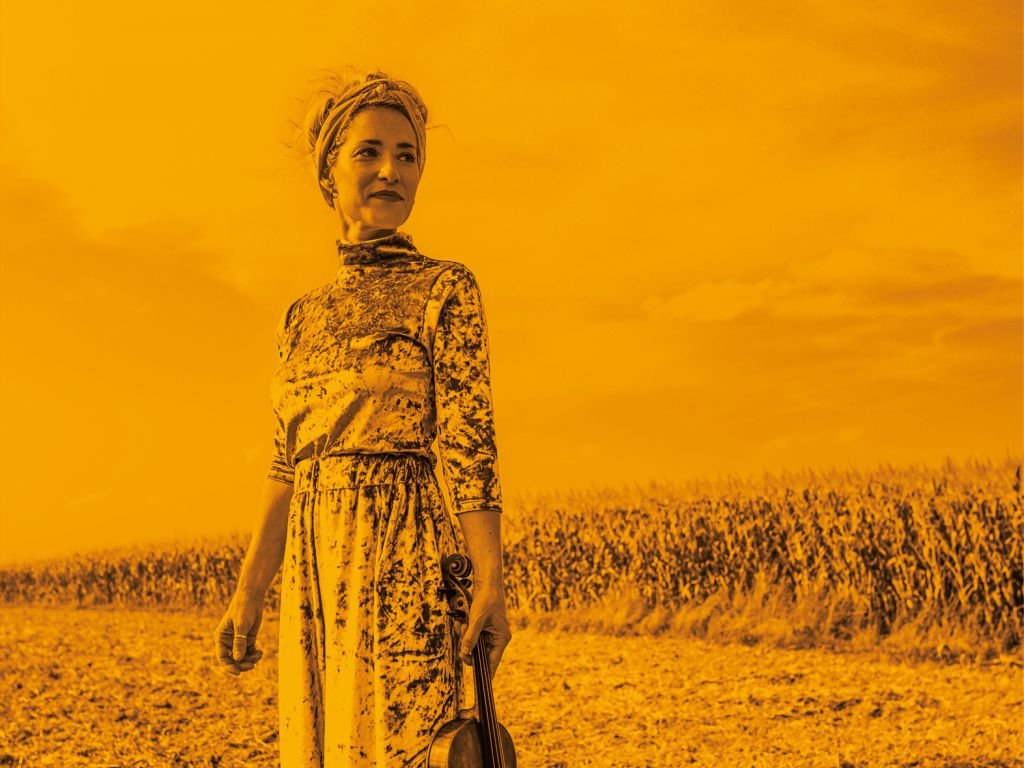
Julia Lacherstorfer
Freelance musician & festival director
Julia Lacherstorfer works as a musician with the groups ALMA, Ramsch & Rosen, and Spinnerin [a female narrative], and she’s also co-artistic director of the festival wellenklænge in Lunz am See. Her income hence stems partly from artistic work with her ensemble projects and partly from directing a festival together with her partner Simon Zöchbauer. “For our household, this means 0 % secure income from regular employment and a 100 % income loss due to the Covid-19 crisis.” From mid-March to the beginning of April, twelve of her planned concerts were cancelled—some of which will take place a later date. For this artistic and private couple, the current situation has left them dependent on state financial support. As the two members of the duo Ramsch & Rosen, this has been practical insofar as they’ve been able to do things like film a living room concert for the Austrian Cultural Forum in Rome. They’ve also already given a streamed performance in the empty Vienna Konzerthaus. As of three weeks after the Covid-19 mitigation measures were introduced, they’d already received two payments from the Coronavirus Hardship Fund: “I absolutely am grateful for the measures taken by the City of Vienna and the federal government. But I’m beginning to get the impression that they more or less checked us off the list with quick fixes and zero long-term vision. There needs to be a discourse between the government and the freelance scene; otherwise, we’ll be losing decades’ worth of cultural groundwork within a few short months,” Lacherstorfer remarks. She’s used to spending time in a home office setting, and she makes an effort to keep her days as productive as they’d be otherwise. “I start my day with meditation and yoga, continue with office work, compose and practice, and do daily exercise—which, right now, is especially important for my mental health.” What she’s currently missing most is the social and musical exchange with her band ALMA. “One finds other ways to network, and that’s a good thing. But for me, this crisis also makes it very clear just how valuable culture is to our society—and I don’t mean just digital art forms, here, but cultural encounters in all their facets. They enrich our everyday lives with magic and inspiration, and those are things I’m really looking forward to.” As of right now (mid-April), it’s still unclear whether the wellenklænge Festival—planned to take place in mainly open-air settings starting in mid-July—will be able to go forward. “Maybe we’ll get lucky and be able to put on events subject to certain conditions,” is her still-optimistic take. Above all for those who had it tough to begin with, she views the current crisis as being a tremendous catastrophe. And it would be too simple, she says, to just sit in her comfortable living room and call this an opportunity for humanity—which, after all, would really be just one of its many aspects. Even so, she does hope “that our outlook and our actions will be informed by a bit more humility once we’ve gotten through this crisis.”
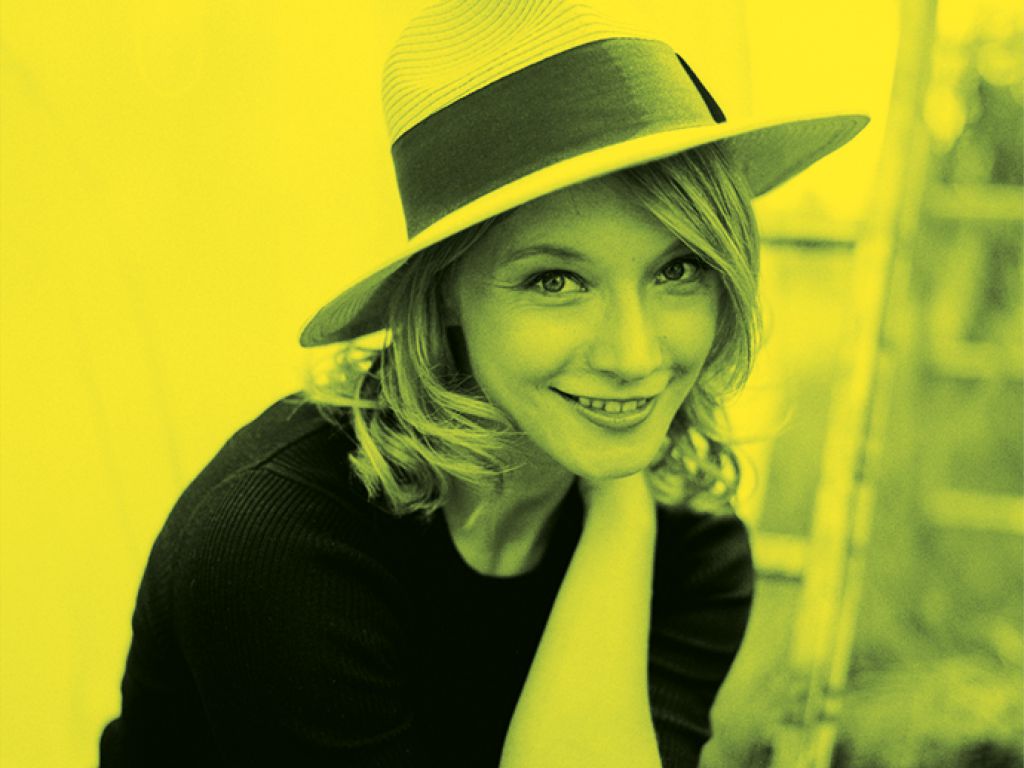
Verena Doublier
Composer, author, singer, & guitarist
Verena Doublier makes 90 % of her living from work as a freelance artist (with Wiener Blond and Prater WG). “I always find work to do, but I make my income mainly from concert proceeds—which just aren’t there at the moment.” Between ten and fifteen of her concert dates between mid-March and early April had either been cancelled or rescheduled for later. “Since our agency and lots of concert organisers reacted pretty fast, we actually have now managed to find a few replacement dates. But festivals and one-time events are a bit different. Some are getting cancelled without replacement, while others are rescheduling for 2021 with identical line-ups.” That means uncertainty, above all, “which you can only respond to with the certainty that the path we’re on is the right one for all of us,” says Doublier. Streaming is something that she generally cares about a lot; at the moment, though, she’s not yet doing any streamed concerts at home out of a concern for artistic and audiovisual quality: “I just can’t ensure that level of quality in my living room.” Assistance packages are of great importance to her, too, when it comes to getting through this period: “The situation and the various offerings are hard to wrap your head around. I’d advise any musician to seek out information from institutions like the Musikergilde (Musicians’ Guild) and the collecting societies or look on the website of the Künstlersozialversicherungsfonds (ksvf – Artists’ Social Insurance Fund).” For the moment, though, taking a breather is Verena Doublier’s strategy of choice. “I’m not demanding too much of myself, I’m staying alert, and I’m keeping in close touch with kind people.” She’s approaching plans for future events with a mix of caution and optimism; at present, the effects of the crisis on her situation can’t yet really be predicted. “But one thing’s clear: failure is going to become acceptable—which, in Austria, is something that’s long overdue,” says the artist. She goes on to point out that one shouldn’t forget the people who work together with artists professionally, since their livelihoods are likewise seriously threatened: “Concert technicians, concert promoters, agencies, club proprietors, and labels are all dealing with the biggest challenges they’ve ever faced. A lot of things are going to change, and I fear that we’re going to be reminded of this by more than just some obligatory pandemic clause in future event contracts. But the industry needs diversity, and that something we’ve got to preserve during this crisis at all costs.”
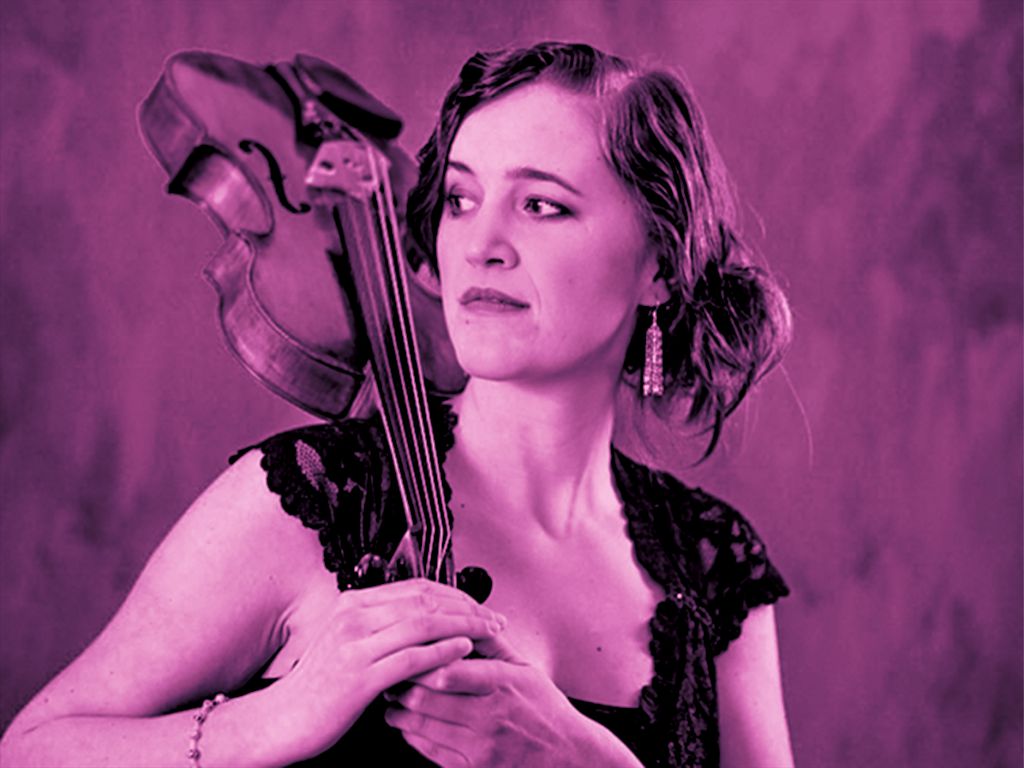
Anna Dekan-Eixelsberger
Chamber musician, tutor, & music educator
Anna Dekan-Eixelsberger works as a musician with the Adamas Quartet, the chamber music group Atout, and the Amadeus Ensemble Vienna. She teaches at both the regional music school in Sieghartskirchen and the Freie Musikschule Wien, and she frequently guest-tutors at prestigious music courses. Her performing and teaching activities thus give her two financial legs to stand on. “I’m in the happy situation of having an easy time continuing my teaching online from home, which has enabled me to uphold at least one line of work. But all of my artistic activities, of course, have either fallen by the wayside or come to look very uncertain.” Between mid-March and early April, seven of her concerts got cancelled while a number of programme points were moved to autumn. She’s therefore now facing financial losses and a need to rethink her planning for the upcoming season. Dekan-Eixelsberger’s transition to online teaching went both quickly and smoothly. “My students have video lessons at their accustomed times and also send me videos of their own that enable me to follow what they’re working on much more easily. The fact that you really are very dependent on your Internet connection is an unfortunate drawback of video teaching, though. Above and beyond giving lessons, I record a video tutorial once a week where I focus on a specific theme that’s relevant to practising and music-making. And one interesting thing for me to observe is how fast particularly my young students have adapted to this new situation.” As far as her ensembles go, she’s now involved mainly in discussing special concert formats for this autumn. She’s so far refrained from requesting financial assistance for reasons of solidarity: “Sure, I’ve also taken a financial hit due to the many cancellations—but since I’ve been able to teach, I’d rather forego that money in the interest of those musicians who live exclusively from giving concerts.” Together with her husband, who’s also a musician, she’s currently spending a lot of time at their house in the Vienna Woods. “The most difficult thing for us is that we can’t see our families. Video chats can never replace the feeling of being together and having a family life.” But even so, she is indeed optimistic about the future: “I’m absolutely convinced we’ll be getting back to that.”
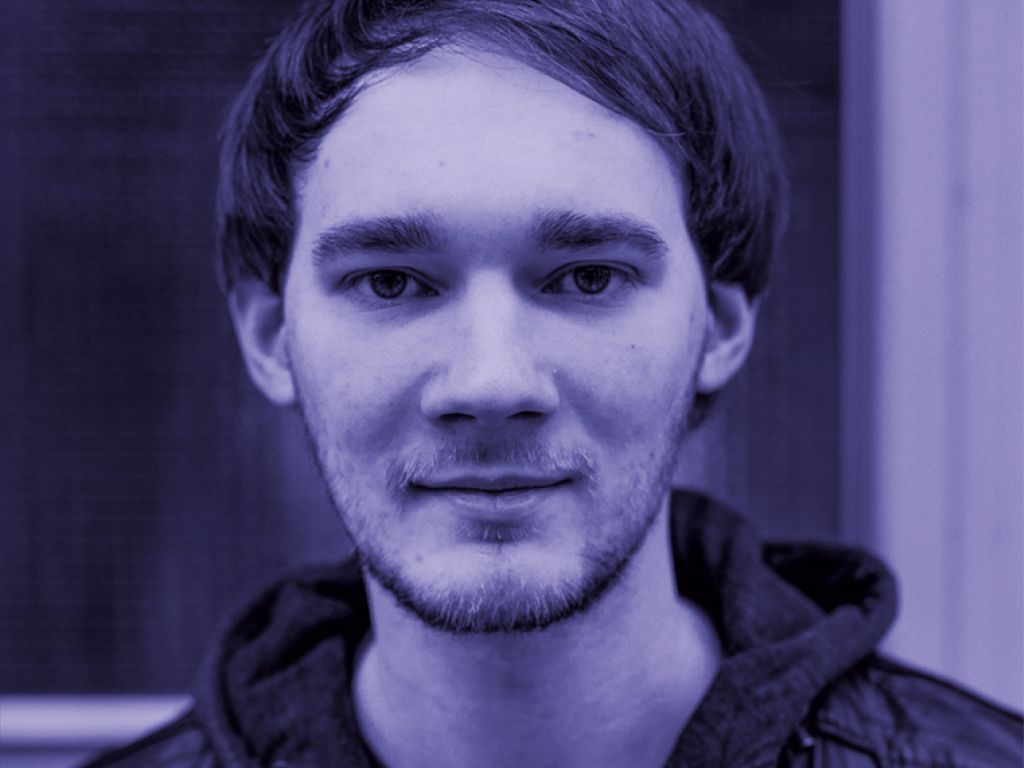
Felix Hafner
Freelance director
Felix Hafner makes his living directing productions at various theatres, and the Covid-19 measures have forced one of his productions to close early. “I’m luckily getting paid in full for that one, which means I’ll be dealing with less consequences in the short term. But farther out, things could get pretty tight for me, as well.” One of his premières was moved to this autumn, and a number of minor engagements at summer festivals are either teetering on the brink or have already been cancelled as of early April. At the moment, neither he nor the theatres can plan things with any certainty.
“It’s difficult to foresee when all of us in the cultural field will really be back to business as usual. And then, there’ll be the question of whether we’ll somehow be able to make up for everything and still mount the productions we’re planning right now,” he explains. Hafner hopes, at any rate, that theatres will be able to reopen this autumn and that his planned October première in Munich will be able to take place—because that’s a production on which a lot of what may or may not come along afterwards will depend. For Felix Hafner, constantly generating free online content would serve zero purpose: “An inability to produce is something one really just has to accept—in order to gather ideas for new things … and to avoid simply chasing views on the Internet content machine.” For many of his colleagues, the assistance packages aren’t enough—above all considering how this might turn into a financial dry spell of half a year or longer. “Myself, I’ve only applied for a working grant since I don’t actually have any lost income at the moment.” Hafner tries to preserve the greatest possible degree of normalcy and structure in his everyday life with preparations for upcoming projects. “I’ve also started studying French again, and I’m trying as hard as I can to deal with my insecurities in the current situation as well as generally preserve my ability to take joy in things.” Despite how things are now, he’s trying to get his new ideas for the post-crisis period into as concrete a form as possible. “Financially speaking, I’ll probably come out of this with no more than a black eye. But the wider-reaching effects, particularly at institutions like theatres, simply can’t yet be predicted. Maybe there’ll be less for me to do in the future, and then I’ll have to adapt. But for that matter, many of my colleagues are facing a truly existential threat—and both the political decision-makers and the institutions need to provide these people with some security right now if we want to avoid returning to an utterly barren cultural landscape.
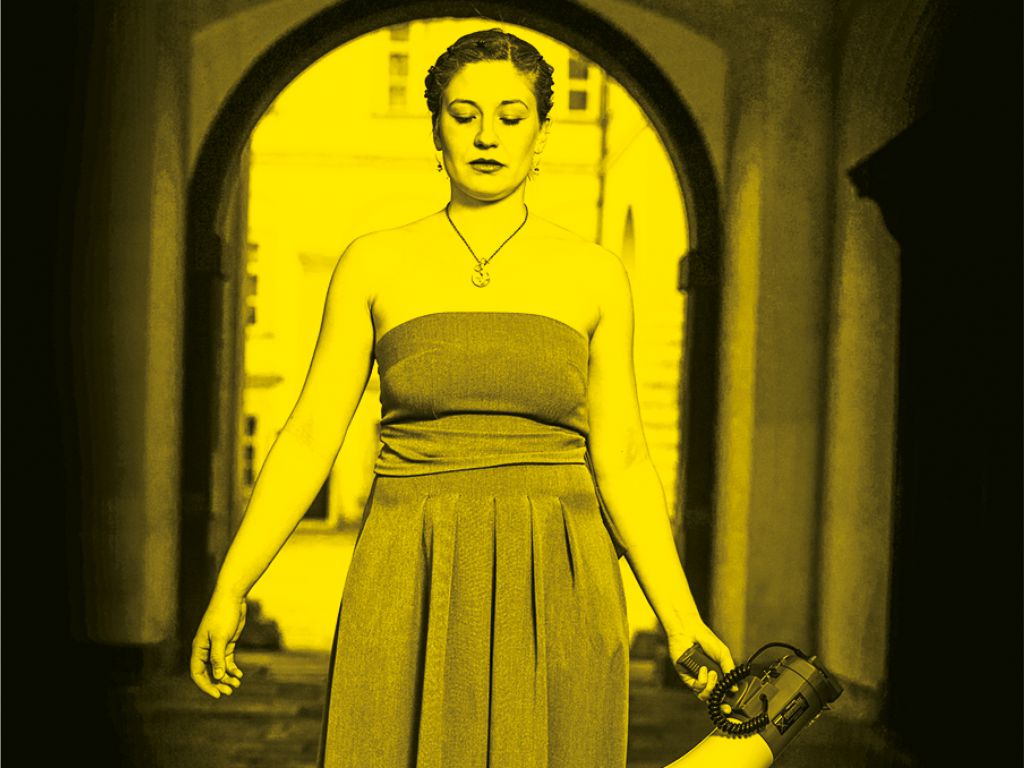
Clio Montrey
Composer, singer, multi-instrumentalist, & author
Clio Montrey earns her living as a freelance singer and composer while working on her dissertation at the mdw. “From one day to the next, all of my jobs evaporated,” she reported in early April—meaning that for the period between March and 20 June, opera performances, a concert tour, and numerous other concerts were cancelled. Alternative dates for some performances are set but will not happen for some time. So more or less overnight, her sources of income vanished—and she now has to find new ways forward, including ways of motivating herself to work on her solo projects. On her page at Patreon (a social payment service provider via which fans can support artists with regularly recurring, self-chosen sums of money), she’s publishing short stories, soundscapes, and pieces of music, and she’s performing live-streamed concerts. Montrey has already received support payments from one assistance fund and still has to apply to some other funds that are relevant to her. “I don’t know what I’d do without this help. I’m grateful for the support, but I do still have to look around for more work.” Even so, she tries not to worry too much. “I’m continuing with my art. I’m also learning new electronic techniques that I’ll be able to use in future concerts. And I’ve already written a lot of science fiction,” says the artist. New projects, too, as well as collaborations with musical colleagues and other artists, are things she’s currently trying to plan. But Clio Montrey is among those who are now looking ahead with mixed feelings: “At the moment, it’s a combination of immense sadness and loss … but also determination to keep on creating things. And right now, I’m missing my colleagues and friends most of all.”

